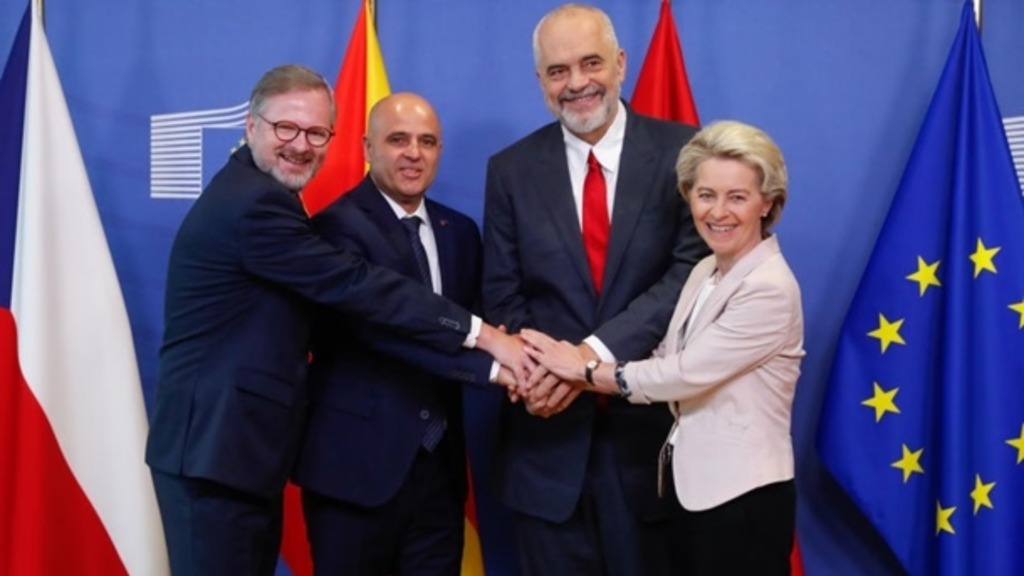The European Union’s 27 Member States have officially launched accession talks with North Macedonia and Albania, whose accession negotiations have been pending since 2020.
The two countries in the Western Balkans have fiercely criticised the slow progress of their accession process, particularly after Ukraine’s membership bid was accepted within months after Russia’s invasion of the country.
Since Russia invaded Ukraine, the strategic importance of the Western Balkans to the EU has increased, as Russia’s influence lingers in the Balkans.
Progress at last
EU countries have “just agreed to open accession talks with Albania and North Macedonia!” Czech Prime Minister Petr Fiala, who currently holds the rotating EU presidency, wrote on Twitter. “We have taken another important step towards bringing the Western Balkans closer to the EU,” he added.
The two countries’ leaders met Fiala and the EU delegation in Brussels on Tuesday to open the accession negotiations at the first intergovernmental conferences.
Opening of the accession negotiations is a great milestone for Albania and North Macedonia. I congratulate both countries on this important step and wish them a smooth path to the European Union.
— Petr Fiala (@P_Fiala) July 19, 2022
European Commission President Ursula von der Leyen welcomed the opening of the talks. “You’ve made all these changes not because they were necessary on your path towards the European Union, but above all, because they are good for your countries and they are already delivering a better quality of life for your people,” she said at a press conference.
Both countries have made numerous reforms to the rule of law, freedom of press and corruption in order to start the talks.
North Macedonia's obstacles
“It is a great satisfaction that after 17 years, today, we are finally starting the negotiations […] slowly but surely, we are joining the large European family,” said Dimitar Kovačevski, Prime Minister of North Macedonia.
North Macedonia was granted EU candidate status nearly two decades ago, but negotiations were previously blocked by Bulgaria over language and cultural issues.
However, the Bulgarian parliament agreed on Saturday to lift its veto after North Macedonia committed to amend its constitution to acknowledge a Bulgarian minority. North Macedonia has already successfully worked through differences with Athens in order to join NATO in 2020.
Albania's position
Albania was granted EU candidate status in 2014. The Bulgarian obstacle for North Macedonia also blocked the path to accession for Albania, as the two countries are treated by the EU as a package.
Albania’s Prime Minister Edi Rama said that the Albanian people never “gave up the dream to pursue the European path”, despite “three very, very difficult years” on Tuesday, referring to numerous obstacles, the pandemic and Russia’s war on Ukraine.
Related News
- EU agrees to open accession negotiations with Albania and Macedonia
- Enlargement: Will North Macedonia accept French proposal to start accession negotiations?
- Western Balkans frustration at the EU reaches boiling point
The accession process is likely to take several years for Albania and North Macedonia. The fastest countries to negotiate accession were Austria, Finland and Sweden, where the process took under two years; Croatia took almost eight years to become a full member of the Union.
During the accession, each EU country still has the right to veto any chapters and Bulgaria has reserved the right to do so if North Macedonia does not implement the agreed-upon protocol.
Stumbling blocks could be bilateral issues or domestic unrest and the EU's "absorption rate" which refers to its capacity to absorb a new Member State. However, with Russia on the continent's doorstep, the strategic importance has increased.

